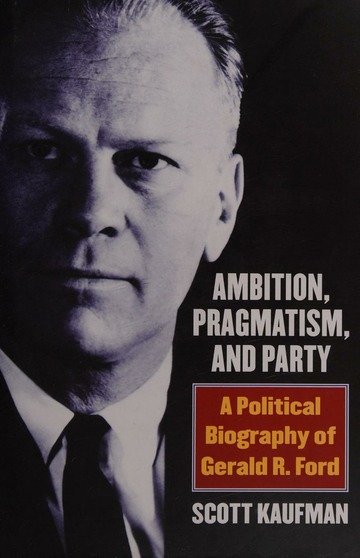Gerald Ford
Ambition, Pragmatism, and Party: A Political Biography of Gerald R. Ford by Scott Kaufman
Tier Three
Scott Kaufman's "Ambition, Pragmatism, and Party: A Political Biography of Gerald R. Ford" delves into the life of the 38th President, exploring the complexities that defined his political career. As I went through this biography, I found a nuanced portrayal of Ford's character, decisions, and the broader political landscape of his era. It didn’t live up to the previous few biographies (or presidents) on the list, but it was a serviceable book.
One of the highlights of Kaufman's work is the attention given to Betty Ford, Gerald's wife. The book provides a captivating glimpse into her role as First Lady, her advocacy for breast cancer awareness, and her openness about personal struggles, notably her battle with addiction. Betty Ford emerges as a resilient and influential figure, adding depth to the narrative and showcasing the impact of personal stories within the political sphere.
While the biography skillfully captures the essence of Ford's political journey, one decision looms large and casts a shadow over his legacy—the pardon of Richard Nixon. Kaufman provides a detailed examination of this pivotal moment, acknowledging its consequences and the lasting impact on Ford's political career.
The argument against the pardon revolves around the belief that it allowed Nixon to evade the consequences of his actions, undermining the principles of justice and accountability. Ford's decision, while rooted in a desire for national healing, ultimately became a source of contention and criticism, reshaping the public's perception of his presidency.
It was the wrong decision, one that not only doomed Ford's political trajectory but set a disconcerting precedent for accountability in American politics. We live in the ashes of that decision. Ford had his reasons. He was a loyal party servant and felt that further punishment for Nixon would be bad for the party and the nation. He wanted to heal the country, not further divide it, but sometimes presidents have to make difficult choices. This was Ford’s chance to do that, and, in my opinion, he failed the test.
In the realm of political biographies, each author brings a unique perspective to the table. In my journey through Ford's life via Kaufman's lens, I couldn't help but reflect on previous biographies that had captivated me more. The comparison is inevitable, and it's worth noting that individual preferences play a significant role in shaping one's perception of a particular work.
Kaufman's biography, while competent, may suffer in comparison to its predecessors, as it doesn't offer the same level of engrossing storytelling or groundbreaking insights. It's essential to recognize that this is a subjective judgment, influenced by the expectations set by prior works on Ford's life and my affinity for past biographies. Ford is an interesting man whose path to the presidency was meandering and peculiar. He wasn’t even elected as Nixon’s Vice President (that was Spiro Agnew, who had to resign from a separate scandal).
I worry that with Ford, people only think of Watergate and those Chevy Chase SNL skits. So, to not fall into that same trap, let’s talk about something else—his role in the Mayaguez incident in 1975. This incident unfolded in the wake of the Vietnam War and marked a test of Ford's leadership during a time of international crisis. In May 1975, the American cargo ship SS Mayaguez was seized by Khmer Rouge forces near Cambodia. In response, President Ford swiftly ordered a military rescue operation known as Operation Frequent Wind. The operation was not without challenges, resulting in casualties and controversy. Ford's decision to use military force in defense of American interests, while reflecting a commitment to assertive action, faced scrutiny both domestically and internationally. The Mayaguez incident is a lesser-known episode in Ford's presidency, highlighting the complexities of navigating global affairs in the post-Vietnam War era and the difficult choices leaders must make in the face of unforeseen challenges.
Overall, I found myself engaged in the narrative but couldn't shake the feeling that the biography fell short of the captivating allure presented by previous presidential biographies. It’s a shame because I think there was more there.
In the end, the strength of Kaufman's biography lies in its meticulous examination of Ford's political career and the intricate dance between ambition and pragmatism. The exploration of Betty Ford's influence adds a human touch to the political narrative, reminding us that behind every leader is a complex personal story. While the pardon of Nixon remains a tarnishing mark on Ford's legacy, it serves as a testament to the intricate and often unpredictable nature of political decision-making.
In the evolving landscape of political narratives, each biography adds a layer to the understanding of historical figures. Kaufman's work contributes to this ongoing dialogue, offering readers a comprehensive look at the life and times of Gerald R. Ford, a man who navigated the corridors of power with ambition, confronted challenges with pragmatism, and remained loyal to his party even in the face of controversy.
